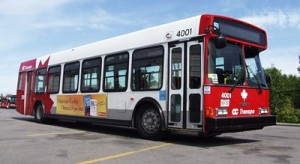I know this won’t be popular but I read this article this afternoon and was curious if I’m the only one who thinks it’s wrong that seniors are getting a further discount on OC Transpo fares.
City gives seniors transit fare break.
Under a change that had been recommended by the city’s seniors advisory committee, seniors would use one bus ticket — instead of two — per trip. Seniors can currently buy two tickets for $2.50.
Here’s the problem I have, why seniors?
Are seniors the only ones on fixed incomes? Are seniors the only ones who use the bus?
In general, I am not a fan of different rules for different demographic groups. Transit service is a public good and should be supported equally by all those who use it.
Will regular bus fares now be rising to support these seniors discounts? Do low-income Ottawa residents between the ages of 18-65 get a break too? How about single mothers? Recent immigrants? I can make a compelling case for many different groups of people.
The idea that society should subsidize one group at the expense of others means that someone is going to lose on the other end. Someone has to pay.
What about seniors who don’t need the help and are living off of generous pension plans? Plans that will in all likelihood bankrupt the system preventing those in future generations from enjoying them.
As our population ages, the proportion of citizens who are classified as seniors is only going to increase, how are we going to afford to subsidize all of them?
It’s bad enough that my generation and others will have to face increased future taxes to pay for the golden pension plans and health care obligations of past generations. Do we need to add insult to injury by expanding the seniors discount?
The Baby Boom Generation is going to force us to rethink our position on seniors. With so many of them about to hit their golden years, society simply cannot afford to rely on the stereotype of seniors as poor, old people.
OC Transpo fares have skyrocketed in recent years putting pressure on many low-income Ottawans, people raising children with no choice but to take the bus to work to pay the bills. Where is their fare break? Sorry 33-year-old single mom, you have to pay more so seniors can pay less.
This idea reeks of an election ploy for incumbent councillors, yet another reason why transit should be off-loaded to an arm’s-length commission to keep politics out of transit decisions.



